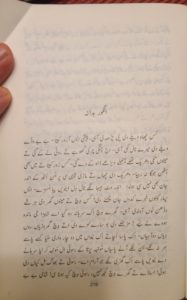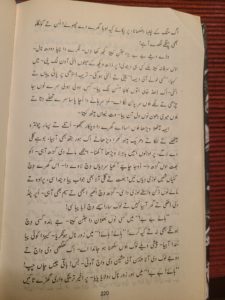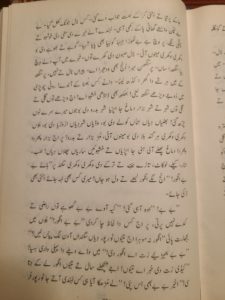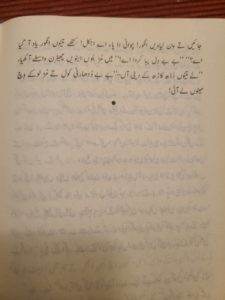
As many of you know by now, I am colonel Nadir Ali’s son; many of you know him because of his speech and interview about Bangladesh, but that was not a subject he usually talked about. What he DID talk about and write about for 40 years was Punjabi literature and Punjabi culture and his contribution to it was to write dozens of short stories set in various Punjabi settings. Many of these were published in two short story collections (Kahani kara and Kahani praga), one of which won a National book award, but both of which are now out of print. But Sucheet Kitab Ghar in Lahore has published ALL his writings in one large edition of their magazine “Pancham”. I managed to catch Covid and am laid up in quarantine (I had only mild symptoms, am fully vaccinated) so decided to translate some of his stories into English. My first attempt follows. The original Punjabi version I will post as screenshots at the end of this post. The full text of Kahani Kara can also be found as a PDF on scribd here.
Grapes
I had been feverish since morning but by the afternoon it was really burning up. Amma had been with me since morning and it was very late when she finally left to take food to the men in the fields; she dragged my cot to the shade of the chinaberry in the lower courtyard and left me there. The fever raged and I was too far gone to get up from the cot. The chinaberry provided little shade, but I was too weak to get up and go inside; I had recurrent cramps and a sinking feeling in my heart. When will this suffering end? In my feverish imagination, I felt as if everything in the house was about to attack me. We had one pillow in the house and whoever felt most needy could use it. The smell of every family member had sunk into that pillow, which seemed to consist of two uneven lumps of cotton wool. I threw my head on it one way, then another, but without relief. I turned from facing the hand pump to face the empty kitchen and thought for a moment that I had found relief, but it was fleeting. Kitchens are for fortunate people. Our whole house had nothing in it, what to speak of the kitchen. In the evening my mother would borrow a glowing lump of coal from the neighbors and start the fire, but what was there to cook? Everyday we got the same chickpeas; even turnips seemed to be a luxury now!
This morning amma had tried her best to get me to eat something. A piece of roti with some milk, but one look at the milk made me feel like throwing up. I asked for salty lassi instead, but when I drank some I threw up. I felt very thirsty, but every time I drank water, I threw that up too. That gnawing hunger was bad enough, but then I felt my heart sink as well. As the fever rose higher, I felt like my head was going to explode. I tried the thicker end of the pillow, but that seemed to hurt my back so I shifted to the lower end, but without relief.
This lower courtyard is more or less the center of our house. The upper courtyard is for sleeping, the lower one has the handpump and the kitchen is on the other side of it. There is another open space as well, next to the door to the alley, we just called it the outer courtyard. Next to that is Amma’s room, which has only one door at this time. Chacha says he will put the other door on before winter. The door to the outside is also about to give way, and we need it to shut in the animals at night. Her room was always dark and dank with the smell of our waterlogged soil. In fact our entire village has hardly any houses and the land is all waterlogged!
“Hai Maa!”, I called out agonizingly. After all, if one cannot even cry out when sick then what is one to do? I called out again: “Hai, Hai..”. Not that anyone could hear me. In the afternoon the whole village falls into a coma; all one can hear is the cry of the doves and the rhythmic sound of our village’s very own flour mill. And that’s it. No one else makes a sound. “Hai maa..” I cried out again. Then dragged myself to the water pot the third time, turned around, threw up, and lost all hope. The fever opened up my senses though. Mother had prepared some mud for plastering the walls and the smell of the wet earth wafted up to me. But she had also added cow dung and some hay to the mix and it seemed to me that I would smell each item separately. I even smelt the soap lying in the washing area. Or I thought I smelt it. I wonder if all these smells were just in my head. My sense of smell is very good in any case. I may not see or hear something, but I can always smell it. Someone roasting some nuts, someone eating roti with ghee.. I could smell that a mile away. Hunger is also a smell. Today I smelt the neighbors, the village, the city, all the way to the bazaar in Nurpur city. I missed the city smells so much! The smell of the brick kilns, the smell of hot coals, the smell of the city’s giant garbage heap; I could smell it all; then I smelled Badru’s shop, but finally it was the fruit shop that got me. The smell of each individual fruit floated into my nostrils; mangoes, pomegranates, bananas, loquats, fresh smells and stale smells, I could tell each one apart, but oh amma! The grapes! It seemed to me that if only I could get some grapes, I would recover. My fever would break. My nausea would go away.
Amma! She is finally back! She never comes back from the fields in a good mood but maybe out of regard for my illness she tried to be nice today. “Amma, grapes!” I said it as if inviting her to guess my intention. “Grapes and Raisins! What world is your imagination wandering in today?” .
“it is grape season” I said wistfully and for the first time since morning, I laughed.
“What season are you talking about? It was just last year that I got you a grape, wasn’t it?”Then she too laughed. “Look, you are sweating! When your fever breaks, go to Nurpur and get yourself some grapes. I hear they are 4 annas a pound these days.. Whatever made you think of grapes today?”
“I just had a craving today” I said, half in jest.
“Here, i will heat you some milk” she said, and brought me back; back to the village, back to this house, back to me.
Punjabi Original: Full Text of these stories is also as a PDF here: https://www.scribd.com/document/491943026/Shahmukhi-Kahani-Kara-Nadir-Ali




You should try to get it published in Gurmukhi 🙂
Omar Bhai, not sure if u can answer this question. But here goes nothing.
Did ur dad discuss ever the motivation of a Muslim living in Muslim areas (erstwhile Pak and Bangladesh) to support Congress? I think the only person i know or read about who did that was Shah rukh Khan’s dad, who even moved to India.
I could never wrap my head around that. Had i been at ur dad’s place , notwithstanding how much i would have disliked some of League’s position, i would have still sort of supported them.
A Punjabi short story written in Urdu?
All Punjabi literature in Pakistan is written in the Arabic script. Is that correct, Omar? War is Shah wrote his great Punjabi classic ‘Heer Ranjha’ in the Arabic script.
I was visiting a distant elderly relative when I was 11 years old. He had a big book sitting to the side. I asked him what this ‘Urdu’ book was about. He said it wasn’t Urdu. It was the Punjabi classic ‘Heer Ranjha’.
Everyone in my dad’s generation had Urdu as their preferred language of expression. Of course, in our Sikh household, everybody was supposed to know how to read and write Gurmukhi. But almost no one had any knowledge of the Devanagari script. But we youngsters were expected to study both Hindi and Punjabi. Urdu was never taught.
The original story (attached) is in Punjabi (Shahmukhi script).
That is not Urdu.
I always found the names *mukhi a little weird for Punjabi. Who writes with their mouths?
Perhaps hints at the deeper resonance of oral pre-literate culture of rural Punjab. Regions comprising Pakistan became majority literate for the first time in all of history from early 2000s.
So scripts are seen not as productions of the art of writing or calligraphy (which is a highly developed form in West or East Asia) but as symbolic of utterance. So one writes as the Shah (Bulleh Shah? / Waris Shah?) speaks… or as the Gurus speak. This seems like a continuation of the old dominant culture of bardic poetry to me.
Saurav, I did not have a chance to read comments or answer for a while, but as for your question, i think there were many people who were not Muslim league supporters and it was generally not a big deal in itself (the killing was on the basis of religion, not voting preference in 1946 elections; A Hindu professor in Lahore who supported Pakistan still got killed. Many Muslims who supported Congress never had to face any serious issues. it also depends on how active they were. As far as I understand it, my grandfather was a supporter of Gandhi and the congress, but he was not some sort of office holder or major activist.
I would love it if a transliteration in the Gurmukhi script could be made available by someone capable of reading and writing both the scripts and uploaded as a pdf perhaps.